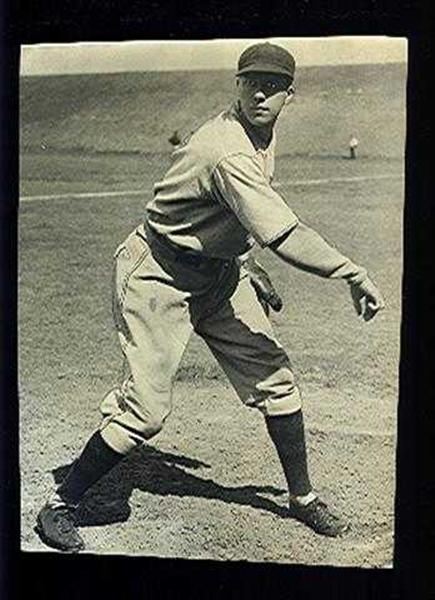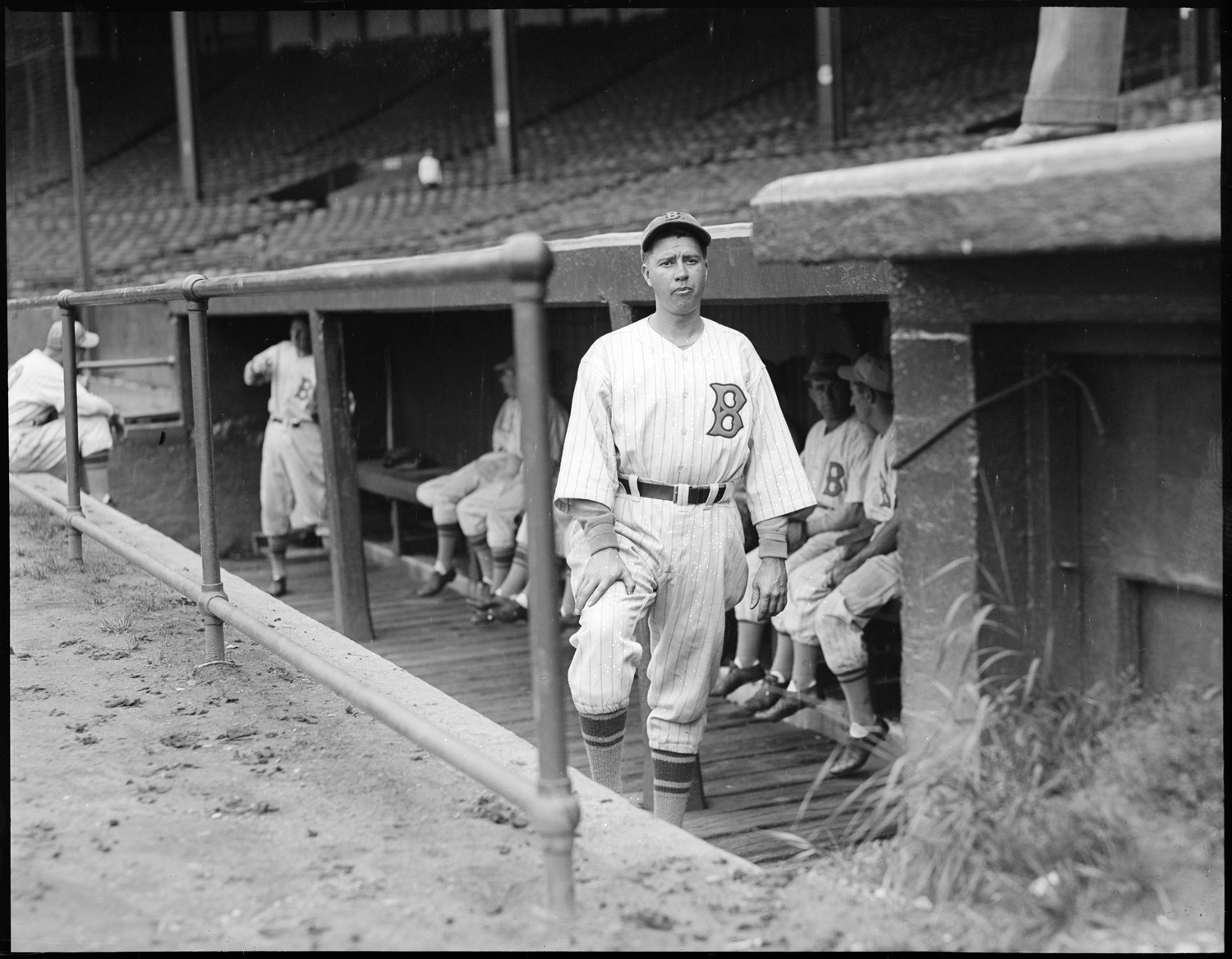Lou Fette died in Warrensburg, Missouri, at the age of 73.
Best Season 1937: 20 wins, 2.88 ERA, five shutouts, 23 complete games, 259 innings – all career-highs
Highlights 1939 National League All-Star
Twice led NL in shutouts (1937, five - 1939, six)
In his major league debut defeated Johnny Vander Meer and the Cincinnati Reds, 3–1 (May 19, 1937)
Best Season 1937: 20 wins, 2.88 ERA, five shutouts, 23 complete games, 259 innings – all career-highs
Highlights 1939 National League All-Star
Twice led NL in shutouts (1937, five - 1939, six)
In his major league debut defeated Johnny Vander Meer and the Cincinnati Reds, 3–1 (May 19, 1937)
Mary Lucille Fette, age 94, died Saturday, Jan. 1, 2011, at the Warrensburg Manor Care Center. She was born on Jan. 2, 1916 in Leeton. On June 4, 1939, she was married in Boston, Mass., to Louise "Lou" Fette who was from Alma, Mo. He was a major league pitcher with the Boston Braves.

Lucille Fette
Before returning to the Warrensburg area, she taught school in Alma. She then taught at Warrensburg High School for 26 years before retiring in 1982. She is survived by two daughters, Susan Butler of Hudson, Ohio; MaryLou Duffield of Lee's Summit; and three grandchildren. She was preceded in death by her husband "Lou" in 1981, her sister Marcella Greer, and her parents, Charles and Mattie Greer. Funeral services will be held at 11 a.m. Wednesday, Jan. 5, 2011, at Sweeney-Phillips & Holdren Funeral Home in Warrensburg, with Pastor Jerry Tharp officiating. The family will receive friends from 10 a.m. until service time Wednesday at the funeral home. Burial will be at Sunset Hill Cemetery.
Louis Henry William Fette
Bats Right, Throws Right
Bats Right, Throws Right
School Missouri Valley College
Debut April 26, 1937
Final Game June 22, 1945
Born March 15, 1907 in Alma, MO USA
Died January 3, 1981 in Warrensburg, MO USA
Biographical Information
"Fette was a country boy from Missouri, a quiet, hard-working mature pitcher who had paid his dues in coming up through the low minors year after year, and he was ready." - from the book Reynolds, Raschi and Lopat about Fette coming up to the majors in 1937
Lou Fette burst onto the major league scene with a 20-10
record as a rookie in 1937. It was all the more remarkable because he did it for the 1937 Boston Bees, a team that had been under .500 the previous year and was not far above .500 in 1937.
Fette was a 30-year-old rookie in 1937, and another elderly rookie, Jim Turner, also won 20 games at age 33. The other two starters on the team had 14 and 8 wins respectively.
Fette was born in Alma, MO and attended Missouri Valley College. Another pitcher, Vern Kennedy, was born five days later in the same state.
Lou spent about a decade in the minors before getting his chance at the bigs. Although he had won 21 games in 1928, he had several years where his record was under .500 and that perhaps held him back. In
1936, though, he went 25-8 for St. Paul and the next year he was in the majors. No other pitcher on the 1936 St. Paul team had more than 13
wins.
Fette continued to have decent ERA's in 1938-39 although his win-loss records were not spectacular. In 1939 he appeared in the All-Star game.
He didn't win a major league game after 1939, continuing in 1940
and 1945 to pitch a few games. He also pitched a little bit in the
minors in 1940-41 and went 11-15 in the minors in 1942. 200 Innings Pitched Seasons: 2 (1937 & 1938)
| Turner and Fette-Unlikely Rookie Phenoms |  |  |
|
Although the Boston Bees were a weak-hitting second-division ball club going nowhere, they caused some surprise around the National League in 1937 when they came North with a pair of "aged" rookie pitchers on their roster, Jim Turner, 32 and Lou Fette, 30.
Turner, from Nolesville, Tennessee, toiled for four years in the Piedmont League, for three years in the Pacific Coast League and played four years with Indianapolis in the American Association without impressing big league scouts. On his 32nd birthday, August 6, 1936, however, he shut out the Minneapolis Millers as a Boston Bees scout watched from the grandstand.
With a "what have we got to lose" attitude, the Bees acquired the righthanded hurler. Turner, who worked in the off-season as a milkman, barely made the team in spring training in 1937. A spot on the roster opened up for him when another pitcher became homesick and was sent home.
Fette, a strapping 200-pounder from Alma, Missouri, began his minor league career as a 20-game winner with Pueblo in 1928 but had few winning seasons thereafter. He labored in the American Association for eight years, first with Kansas City and then St. Paul, before attracting the attention of the Bees by winning 25 games with the Twin City club in 1936.
Neither Turner nor Fette were overpowering pitchers. They fanned few batters but each had a good curveball and control. Nevertheless, it came as a stunning surprise to see both hurlers win 20 games for the fifth-place Braves. Only two other hurlers won that many and they pitched for the pennant-winning New York Giants. Carl Hubbell won 22 and Cliff Melton 20. The latter was also a rookie, giving the National League a remarkable first-year pitching staff in 1937.
Turner, who compiled a 20-1 1 won-lost record, led the league with a sparkling 2.38 earned run average and 24 complete games. Fette posted a 20-10 log, had 23 complete games, and tied Turner and Lee Grissom with five shutouts. One was a 1-0 whitewashing of the Phillies in 13 innings. Deacon Danny MacFayden also pitched well for the Bees, compiling a 2.93 ERA while winning 14 and losing 14. Veteran Guy Bush had a poor season with 8 and 15. Only two Boston hurlers had won 20 games in the previous 20 years-Joe Oeschger in 1921 and
Ben Cantwell in 1933-so the double dividend from Turner and Fette was much appreciated by manager Bill McKecknie.
On the other hand, the Bees finished last in batting with a team average of .247. While Joe Medwick was hitting .374, Johnny Mize .364, and Gabby Hartnett and Paul Waner .354, the Bees had to rely on Gene Moore with a .283 mark and Tony Cuccinello with .271. Rookie Vince DiMaggio batted .256. Catcher Al Lopez hit only .204, but he did a marvelous job with the rookie pitchers.
Fette won only 11 games in 1938 and 10 in 1939 when he led the NL with six shutouts. He pitched two scoreless innings in the 1939 All-Star game, but later that season hurt his arm. He didn't win a game after that. After an absence of several years he came back to hurl in five games for the Boston NL club in 1945.
Turner also wasn't able to match his initial major league season, but he did stay around longer than Fette. He was 14-18 in 1938 and 14-7 with Cincinnati in 1940, and pitched relief for the Yankees during the War years. He played in two World Series, with the Reds in 1940 and the Yankees in 1942. He later coached for 23 years with those two clubs.
Considering what took place in their careers before 1937 and what took place after 1937, that one season certainly stood out as the high point for these two rookie phenoms.
|
 |
| Lou Fette, Boston Bees |
2-time NL Shutouts Leader (1937 & 1939)
15 Wins Seasons: 1 (1937)
 |
| Lou Fette Marries Lucille Greer |

Pitching Star weds after going to the wrong church. June 5, 1939 Photo. Brookline, MA. Lou Fetter, Boston Bees Ace pitching star, with Miss Lucille Greer of Leeton, Missouri. Before their wedding on June 4. They are pictured outside the Brookline Baptist Church just before they learned they would have to have their nuptials performed at the Brookline Church but because he procured a marriage license in Boston, the service could not be held here. The couple was finally married in the Second Unitarian Church in Boston.
 |
| Lou Fette |

 |











